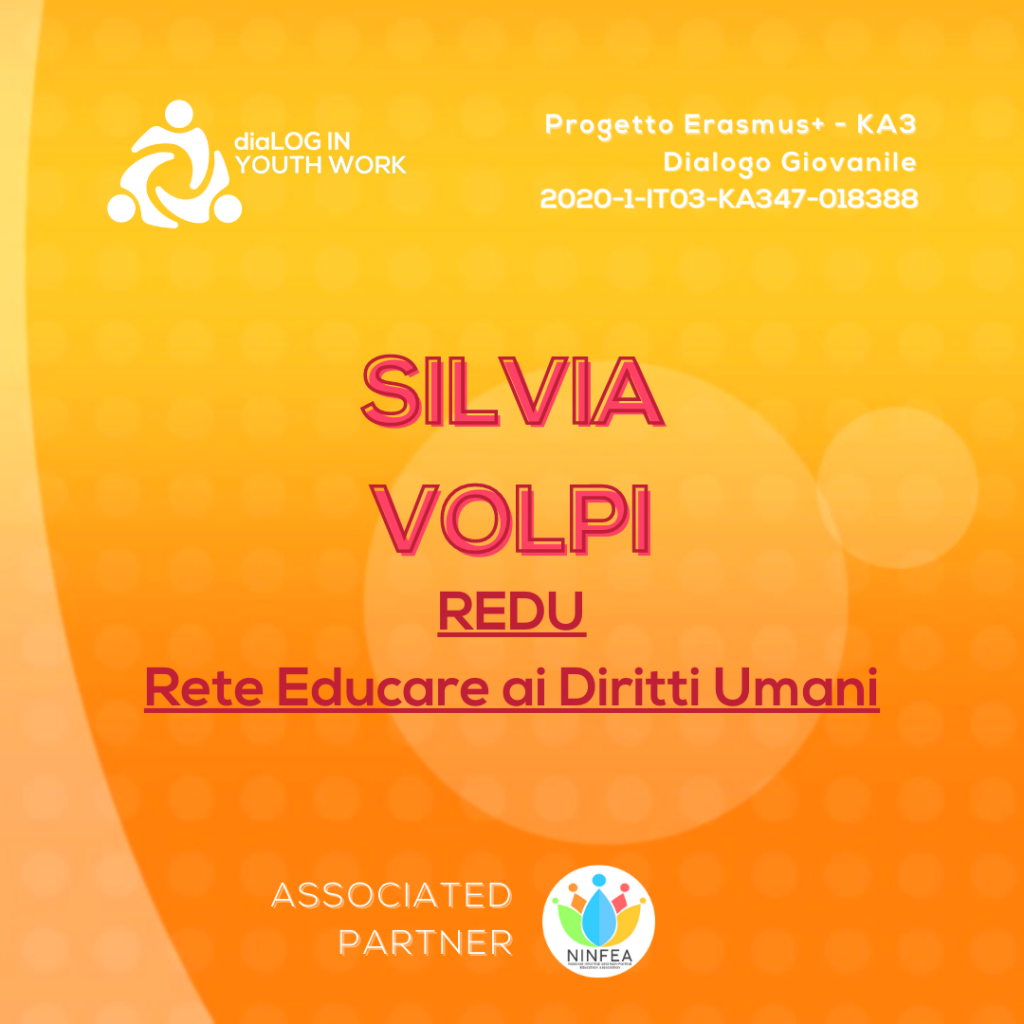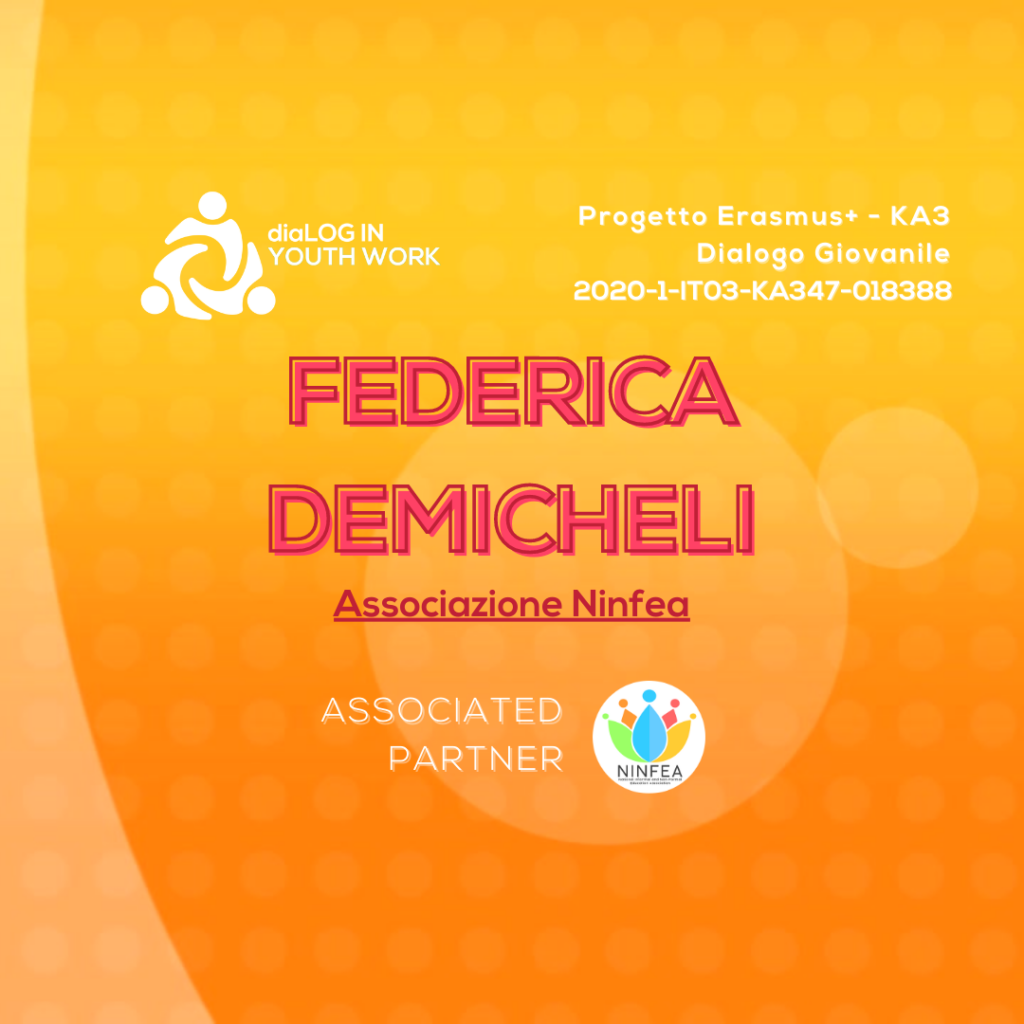The second episode of the publication cycle “Youth Work Pearls” is online. It is a series of video interviews, with related transcripts, carried out within the project DialogIn Youth Work, Erasmus Plus – KA347 – Youth Dialogue Projects.
Today’s protagonist is Silvia Volpi for REDU- Rete Educare ai Diritti Umani, a network of educators and trainers who work to promote effective methodologies and tools for Human Rights Education.
Watch the full video:
Giosef Italy: What do you do in the field of Youth Work?
This is quite a challenging question, so I’ll try to be brief and tell you who I am.First of all, as you can easily hear from my accent, I come from Tuscany and I was born very close to Florence. Since I was about 15 years old, I started doing voluntary work and what was then called “socio-educational animation”, especially in summer centres. At the same time, since I never got tired at that age, I also liked being a trainer, or as we would say today, a coach for an athletics team. I’ve always been in contact with young people and above all I’ve developed a passion for the processes of education and accompaniment.
Over time I continued to study, I worked in France for a long time where I experienced the world of formal education, then I became a teacher.
But my interest in educational processes remained firm, regardless of the context, formal or non-formal, and then I made a definitive choice in 1995 when I started to dedicate myself to Youth Work proper, in an associative context.
I have very fond memories of this period because among the first experiences I had both at national and European level, I remember being part of a training course organised by the national agency for young people at the time, as part of a programme called ‘Youth for Europe’. Since then I have continued to work as a youthworker both in the local and also international context.
I became a trainer always working on what was my interest, my passion, which also led to my professional choice, working on issues related to youth participation, youth policies and especially human rights.
Today I find myself supervising the so-called youth workers in the organisation I belong to, REDU – Rete Educare ai Diritti Umani, to train them and accompany them in their growth processes or to mentor them, to support them where necessary.
Giosef Italy: Should Youth Work have an activist side, and if so, how does it contribute to social change through young people?
This is a complex question that would require an equally complex answer, but I don’t think we’re up to speed. So I try to start from my experience and then try to generalise. In my experience and in the way I have lived the role of the youth worker and the work in socio-educational animation, the activist side was and still is an integral part of youth work, for two reasons. First of all, youth work should stimulate participation, activation and empowerment of young people and thus their growth and ability to have a voice in decision-making processes. In this sense Youth Work facilitates youth activation and youth activism. On the other hand, the person who performs this professional role, i.e. who does Youth Work, if he/she activates processes of empowerment, if he/she works on the theme of inclusion, if he/she works so that young people and especially people who are in situations of difficulty, marginality or exclusion are part of the community and consequently can enjoy their rights to all effects, then in this case he/she has a role that is not only an educational role, but is a role very close to the figure of the activist. And it is also clear to me that by doing this, the youth worker does not have a neutral position. This has been a much debated issue over the years, the positioning of the youth worker if he/she should be neutral and therefore not take a position, but from my point of view and again, again from my experience, it is impossible to be neutral since we spend ourselves for causes. When we talk about social inclusion, about the enjoyment of human rights, it is clear that this has the consequence of taking a position. And this position necessarily has a socio-political meaning, because if we are on the side of rights, we are not neutral, if we are on the side of inclusion we cannot be neutral and if we are on the side of leaving space and power to young people it is necessarily a choice of positioning, even political
Giosef Italy: Youth Work and Social Work, how do they differ and how can they work together?
This is a very good question, which also has its complexity. Let’s say that I’d like to start from the definition of the youthworker, as given by the Council of Europe, in order to answer it. In that paragraph Youth Work is defined as a broad activity of a social, cultural, educational, environmental and political nature for young people in groups and individually. And then it says more specifically: youth work is essentially a social practice that works with young people and the societies in which they live by facilitating the active participation and inclusion of young people and their communities in decision-making. It is important to start from this definition because, from my point of view, the connotation that is given to youth work is very clear, it is explicitly said that the work that is done with young people and for young people is an activity, a social practice. So we say that it is the profession, if we want to talk about profession, or the activity of youth work that can be contextualised in the social field.
Then we could say well, that the youth worker is a social worker. If I translate these words in our national context, there are differences. By pure social worker we sometimes mean different professions, i.e. social worker, educator and others. Very often in the social field we also find people with titles linked to pedagogy, for example psychology or social sciences and so on.
So, if we talk about professionalism, they are different of course, but if we talk about value, the youth worker certainly has a social value and therefore is a social practice. Of course, in the definition the difference is already clear, because when we talk about the youth worker we are talking about a social practice related to the world of youth and therefore contextualised and specifically identified in relation to an equally specific target, if we talk about social work we probably mean a more wide-ranging work that also includes different targets and also different functions.
The question that came afterwards was whether the two professions, whether the two roles can or should work together. From my point of view yes, and necessarily in this case, because it is ideal to think of working in multidisciplinary teams in which the youth worker can work alongside a social worker or even a team of pedagogues and psychologists in order to have an even stronger impact and to be able to confront the problems that can arise in the management of situations that are sometimes not simple.
What I notice is that when we work with passion and with young people, and we work with an open mind and an open heart towards the needs of young people and the criticalities they encounter, if we realise that a certain service does not fall within our area of competence, it is easy to refer to structures outside our own situations, to our cooperatives. Therefore, there is the possibility to do it, to refer, the possibility to work together, but it is not a system and it is not always possible, also because sometimes the steps that need to be done are obviously part of a bureaucracy that does not always facilitate the work and the timeliness in carrying out a team work that would be necessary especially in cases of marginality.



